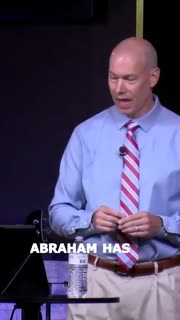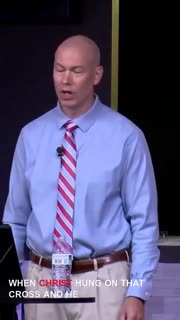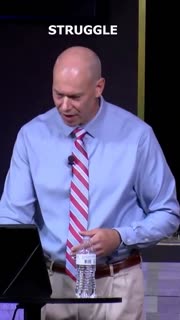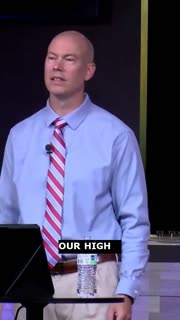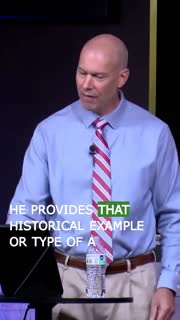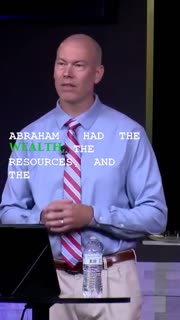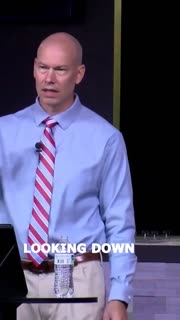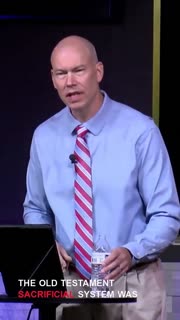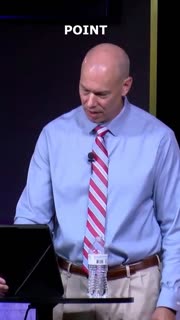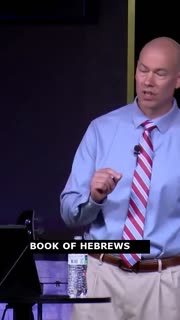Melchizedek: The Eternal Priesthood of Christ
Summary
### Summary
Today, we explored the intriguing figure of Melchizedek, first introduced in Genesis 14, and his significance in the broader biblical narrative. Melchizedek, a king and priest of Salem (likely early Jerusalem), meets Abraham after a victorious battle and blesses him. Abraham, recognizing Melchizedek's exalted status, gives him a tithe. This brief encounter raises many questions, as Melchizedek is a mysterious figure with no recorded genealogy, which is unusual in the context of Genesis.
We then moved to Psalm 110, written by King David, which prophesies about the Messiah being a priest forever in the order of Melchizedek. This is significant because, under Mosaic Law, the roles of king and priest were strictly separated. David's prophecy indicates that the Messiah would unite these roles, pointing to a priesthood that predates and supersedes the Levitical priesthood.
Fast forward to the New Testament, the book of Hebrews elaborates on this theme, presenting Jesus Christ as our great high priest in the order of Melchizedek. Unlike the Levitical priests, whose priesthood was temporary and dependent on genealogical succession, Jesus' priesthood is eternal and perfect. His sacrifice on the cross was once for all, providing a permanent solution to sin, unlike the repeated sacrifices of the Old Testament.
This exploration helps us appreciate the depth of Jesus' role as our high priest. His eternal priesthood assures us of our salvation and his perfect sacrifice effectively deals with our sin. Understanding Melchizedek's role in the biblical narrative enriches our comprehension of Jesus' unique and superior priesthood.
### Key Takeaways
1. Melchizedek's Unique Role: Melchizedek is both a king and a priest, a combination not seen elsewhere in the Old Testament. This dual role prefigures Jesus, who is our eternal king and priest, uniting the two offices in a way that surpasses the limitations of the Mosaic Law. [09:26]
2. Psalm 110's Prophecy: David's prophecy in Psalm 110 about a priest in the order of Melchizedek highlights the Messiah's unique priesthood. This prophecy breaks the conventional separation of king and priest roles, pointing to a future where the Messiah would fulfill both roles perfectly. [20:40]
3. Eternal Priesthood of Jesus: Unlike the Levitical priests who were subject to death and succession, Jesus' priesthood is eternal. This permanence assures us of our salvation, as Jesus continually intercedes for us before God, providing a stable and unchanging foundation for our faith. [30:14]
4. Effective Sacrifice: Jesus' sacrifice is superior to the Old Testament sacrifices because it was offered once for all. His sinless life and perfect sacrifice on the cross provide a complete and final atonement for sin, unlike the repeated and temporary sacrifices of the Levitical system. [33:14]
5. Assurance of Salvation: The eternal nature of Jesus' priesthood gives us confidence in our salvation. We do not need to fear losing our salvation because Jesus, our high priest, lives forever and his intercession on our behalf is perpetual and effective. [32:06]
### YouTube Chapters
[0:00] - Welcome
[04:03] - Introduction to Melchizedek
[05:16] - Abraham's Rescue Mission
[07:50] - Encounter with Melchizedek
[09:26] - Significance of Melchizedek
[10:17] - Speculations about Melchizedek
[12:34] - Peculiarities of Melchizedek
[15:06] - Melchizedek's Royal Priesthood
[18:01] - Psalm 110 and Messianic Prophecy
[20:40] - Messiah as Royal Priest
[22:35] - Historical Context and Fulfillment
[24:42] - Jesus' Fulfillment of Prophecies
[26:36] - Hebrews and the High Priesthood of Christ
[28:34] - Parallels between Melchizedek and Jesus
[30:14] - Permanence of Jesus' Priesthood
[32:06] - Assurance of Salvation
[33:14] - Effective Sacrifice of Jesus
[35:22] - Conclusion and Prayer
Study Guide
### Bible Study Discussion Guide
#### Bible Reading
1. Genesis 14:18-20
2. Psalm 110:1-4
3. Hebrews 7:23-27
#### Observation Questions
1. In Genesis 14:18-20, what actions does Melchizedek take when he meets Abraham, and how does Abraham respond?
2. According to Psalm 110:4, what unique role is prophesied for the Messiah, and how does it relate to Melchizedek?
3. In Hebrews 7:23-27, what are the key differences between the Levitical priesthood and Jesus' priesthood?
#### Interpretation Questions
1. Why is Melchizedek's lack of genealogy significant in the context of Genesis, and how does it prefigure Jesus' priesthood?
2. How does Psalm 110:4 challenge the traditional separation of king and priest roles under Mosaic Law, and what does this imply about the Messiah's identity?
3. What does the permanence of Jesus' priesthood in Hebrews 7:23-27 mean for believers' assurance of salvation?
#### Application Questions
1. Melchizedek is both a king and a priest, roles that are united in Jesus. How does understanding Jesus as both king and priest impact your daily walk with Him?
2. Psalm 110:4 speaks of a priesthood that is eternal. How does this eternal aspect of Jesus' priesthood give you confidence in your faith and salvation?
3. Jesus' sacrifice is described as once for all in Hebrews 7:27. How does this understanding of a complete and final atonement affect your view of forgiveness and grace?
4. The sermon mentioned that Jesus continually intercedes for us. How can this truth influence the way you pray and approach God with your needs and struggles?
5. Reflecting on the assurance of salvation provided by Jesus' eternal priesthood, how can you share this assurance with someone who is struggling with doubts about their faith?
6. The sermon highlighted the superiority of Jesus' sacrifice over the repeated sacrifices of the Old Testament. How can you live in a way that reflects gratitude for this ultimate sacrifice?
7. Considering the unique and superior priesthood of Jesus, what specific steps can you take to deepen your relationship with Him and rely more fully on His intercession and sacrifice?
Devotional
Day 1: Melchizedek's Unique Role
Melchizedek is both a king and a priest, a combination not seen elsewhere in the Old Testament. This dual role prefigures Jesus, who is our eternal king and priest, uniting the two offices in a way that surpasses the limitations of the Mosaic Law. Melchizedek's encounter with Abraham in Genesis 14 is brief but profound. He blesses Abraham and receives a tithe from him, indicating his superior status. This mysterious figure, with no recorded genealogy, points to a priesthood that is eternal and not based on lineage, unlike the Levitical priesthood.
Jesus, like Melchizedek, holds both the kingly and priestly offices. This unique combination allows Him to rule with authority and intercede on our behalf. His priesthood is not temporary or inherited but eternal and perfect. Understanding Melchizedek's role helps us appreciate the depth and significance of Jesus' priesthood, which provides a stable foundation for our faith. [09:26]
Hebrews 7:1-3 (ESV): "For this Melchizedek, king of Salem, priest of the Most High God, met Abraham returning from the slaughter of the kings and blessed him, and to him Abraham apportioned a tenth part of everything. He is first, by translation of his name, king of righteousness, and then he is also king of Salem, that is, king of peace. He is without father or mother or genealogy, having neither beginning of days nor end of life, but resembling the Son of God he continues a priest forever."
Reflection: How does understanding Jesus as both king and priest impact your daily walk with Him? Can you identify areas in your life where you need to recognize His authority and intercession more fully?
Day 2: Psalm 110's Prophecy
David's prophecy in Psalm 110 about a priest in the order of Melchizedek highlights the Messiah's unique priesthood. This prophecy breaks the conventional separation of king and priest roles, pointing to a future where the Messiah would fulfill both roles perfectly. Under Mosaic Law, these roles were distinct and separate, but David's vision was of a Messiah who would unite them, indicating a new and superior order of priesthood.
This prophecy is significant because it points directly to Jesus Christ, who fulfills this dual role. As the Messiah, Jesus is both our eternal king and high priest, providing a perfect and complete mediation between God and humanity. His priesthood is not limited by time or genealogy but is eternal and effective. This understanding enriches our appreciation of Jesus' unique and superior role in God's redemptive plan. [20:40]
Psalm 110:4 (ESV): "The Lord has sworn and will not change his mind, 'You are a priest forever after the order of Melchizedek.'"
Reflection: In what ways can you acknowledge Jesus' dual role as king and priest in your daily prayers and worship? How does this understanding change the way you approach Him?
Day 3: Eternal Priesthood of Jesus
Unlike the Levitical priests who were subject to death and succession, Jesus' priesthood is eternal. This permanence assures us of our salvation, as Jesus continually intercedes for us before God, providing a stable and unchanging foundation for our faith. The Levitical priesthood was temporary and dependent on genealogical succession, but Jesus' priesthood is based on the power of an indestructible life.
Jesus' eternal priesthood means that He is always available to intercede on our behalf. We do not need to fear losing our salvation because His priesthood is unchanging and everlasting. This assurance gives us confidence and peace, knowing that our salvation is secure in Him. Understanding the eternal nature of Jesus' priesthood helps us to trust in His continual presence and intercession in our lives. [30:14]
Hebrews 7:24-25 (ESV): "But he holds his priesthood permanently, because he continues forever. Consequently, he is able to save to the uttermost those who draw near to God through him, since he always lives to make intercession for them."
Reflection: How does the eternal nature of Jesus' priesthood give you confidence in your salvation? What areas of your life do you need to trust more fully in His continual intercession?
Day 4: Effective Sacrifice
Jesus' sacrifice is superior to the Old Testament sacrifices because it was offered once for all. His sinless life and perfect sacrifice on the cross provide a complete and final atonement for sin, unlike the repeated and temporary sacrifices of the Levitical system. The Old Testament sacrifices were a shadow of the ultimate sacrifice that Jesus would make, pointing to the need for a perfect and permanent solution to sin.
Jesus' sacrifice on the cross was a one-time event that accomplished what the repeated sacrifices of the Old Testament could not. It provided a complete and final atonement for sin, making it possible for us to be reconciled to God. This understanding of Jesus' effective sacrifice helps us to appreciate the depth of His love and the completeness of His work on our behalf. [33:14]
Hebrews 10:12-14 (ESV): "But when Christ had offered for all time a single sacrifice for sins, he sat down at the right hand of God, waiting from that time until his enemies should be made a footstool for his feet. For by a single offering he has perfected for all time those who are being sanctified."
Reflection: How does understanding the completeness of Jesus' sacrifice change the way you view your own sin and forgiveness? What steps can you take to live in the freedom and assurance of His perfect atonement?
Day 5: Assurance of Salvation
The eternal nature of Jesus' priesthood gives us confidence in our salvation. We do not need to fear losing our salvation because Jesus, our high priest, lives forever and His intercession on our behalf is perpetual and effective. This assurance is a source of great comfort and peace, knowing that our salvation is secure in Him.
Jesus' continual intercession means that He is always advocating for us before the Father. This gives us confidence and assurance in our relationship with God, knowing that we are always covered by His grace and love. Understanding the assurance of our salvation helps us to live with greater confidence and peace, trusting in Jesus' eternal priesthood and perfect sacrifice. [32:06]
Hebrews 7:22 (ESV): "This makes Jesus the guarantor of a better covenant."
Reflection: How does the assurance of your salvation through Jesus' eternal priesthood impact your daily life? What areas of doubt or fear do you need to surrender to Him, trusting in His perpetual intercession?
Quotes
### Quotes for Outreach
1. "Abraham has given certain promises by God namely he's promised a land numerous descendants and that he would be a blessing through his descendants he would be a blessing to the nations of the earth although honestly it's it's pretty unclear how any of that's going to happen when abraham receives the promises because he doesn't even have a son and he's already well along in years." [04:03] (19 seconds)
2. "When Christ hung on that cross and he bore the wrath of God, it was not for his own sin. No, it was for my sin, it was for your sin, it was for the sin of anyone who would trust in him. And in exchange, we sinners, if we trust in Christ, we receive his perfect righteousness applied to our accounts. So that when God looks at us, he doesn't see a wicked sinner. He sees nothing less than the righteousness of his own beloved son." [24:42] (27 seconds)
3. "Christian, do you ever struggle with assurance, assurance of your salvation? We as believers in Christ never have to worry that God would change his mind about us. That one day he'll just finally have had it with our constant sinning and unfaithfulness. We don't have to worry that something will ever change in the way God administers the world or the universe that result in our loss of salvation." [32:06] (28 seconds)
4. "Jesus Christ, our High Priest, in the order of Melchizedek, is sinless and is perfect. Because of this, he didn't have to offer lambs or goats on our behalf. He offered his own precious blood on the cross as the truly spotless Lamb of God. When he did this, he provided a sacrifice of infinite quality on our behalf." [34:17] (23 seconds)
5. "He provides that historical example or type of a priest that points us forward to that future antithesis. Jesus Christ, our great high priest. And he helps us to understand why Christ's priesthood and his priestly sacrifice is superior to any that came before. Namely, it is eternal and it is effective on our behalf." [35:22] (22 seconds)
### Quotes for Members
1. "Abraham had the wealth, the resources, and the know-how to assemble really what amounted to a 318-train guerrilla army who routed this victorious coalition of kings in a surprise attack and recovered everything that they had taken, all the plunder and all the people." [07:50] (16 seconds)
2. "David is looking down the corridors of time, as it were, and is prophesying that when his greater son, Messiah, comes, there will be something divine about him. He will be exalted to God's right hand. He'll not be just a mere human. Now, when we hear that, that kind of makes sense to us because we're on this side of the cross. We are familiar with Jesus, with who he was, with his claims to divinity, with his proofs of divinity." [19:43] (24 seconds)
3. "The Old Testament sacrificial system was a bloody affair, with lambs and rams and goats being slaughtered daily in large numbers for all sorts of different reasons. But none of these sacrifices actually had any lasting effect. It will be said later in chapter 10 of Hebrews, that it is impossible for the blood of bulls and goats to take away sin. And these sacrifices, really what they were, they were themselves types pointing forward to that future, better sacrifice offered by Christ." [33:14] (31 seconds)
4. "The point being made here is that the Old Testament Levitical priesthood was handed down from father to son, from generation to generation, because the descendants of Levi and Aaron. All sinners. Therefore, each of them had to die. In this way, the Levitical priesthood, that Old Testament system, was fragile. It was subject to weakness. It was imperfect because it depended on human fallen men doomed to death to administer it." [31:04] (26 seconds)
5. "The author's goal in the book of Hebrews is to remind them of the superiority of Christ. And he does this in a variety of ways. Obviously we don't have time to go through all of that today, but just to bring this to our focus this morning, he devotes three chapters, five, six, and seven, to the high priesthood of Christ. And why his priesthood? His priesthood is vastly superior to the one established under the Mosaic law." [26:36] (21 seconds)
